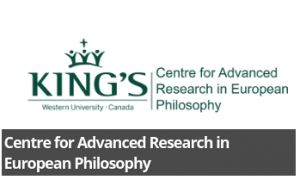 WHY THE KYOTO SCHOOL (京都学派) TODAY?
WHY THE KYOTO SCHOOL (京都学派) TODAY?
The Centre for Advanced Research in European Philosophy, King’s University College at Western University, announces a call for papers for an upcoming international conference: Why the Kyoto School Today?
Date: March 21-24, 2019
Location: King’s University College at Western University, London, Ontario, Canada
Plenary Speakers:
• Dr. Bret Davis (Loyola University Maryland)
• Dr. Rolf Elberfeld (Universität Hildesheim)
• Dr. John Krummel (Hobart and William Smith Colleges)
• Dr. John Maraldo (University of North Florida)
• Dr. Brian Schroeder (Rochester Institute of Technology)
• Dr. Mayuko Uehara (Kyoto University)
• Dr. Jason Wirth (University Seattle)
• Dr. Michiko Yusa (Western Washington University)
The so-called Kyoto School of Japanese philosophy arose out of a critical confrontation (Auseinandersetzung) with the European philosophical tradition at the beginning of the 20th century. This encounter took place at a historically critical period: in both Japan and Europe a world was coming to an end and thinkers in both traditions were searching for new modes of thinking. Japanese thinkers for their part turned to a critical rethinking of modern philosophy and with it the modern world. They sought not to Westernize Japan but to imagine a new modern Japan and provide this new world with its intellectual foundations. Their appropriation of modern thought, however, involved a radical transformation and going beyond many of its inherent problems. At the same time, Western philosophy and with it the the modern world entered into a crisis from which it has arguably not yet recovered. As a result, we find ourselves at the beginning of the 21 stcentury in an even more precarious situation than we did at the beginning of the last century. This conference inquires into the importance of the Kyoto School for our world today. To this end, we welcome abstracts for proposed papers that focus on the possible avenues of thought offered by the thinkers who belong to the Japanese tradition of the Kyoto School widely understood. Papers may focus on any thinker or thinkers in this tradition and on any aspect of their work. What is more, given the dialogical character of the Kyoto School itself, papers can continue this dialogical approach. In all cases, however, papers should be mining this tradition of thought and making the case for its contemporary importance.
Abstracts of no more that 250 words should be sent to: Stephen Lofts (slofts[at]uwo.ca) by December 1, 2018.
For further information or queries, please contact Stephen Lofts (slofts[at]uwo.ca) and/or Antonio Calcagno (acalcagn[at]uwo.ca).